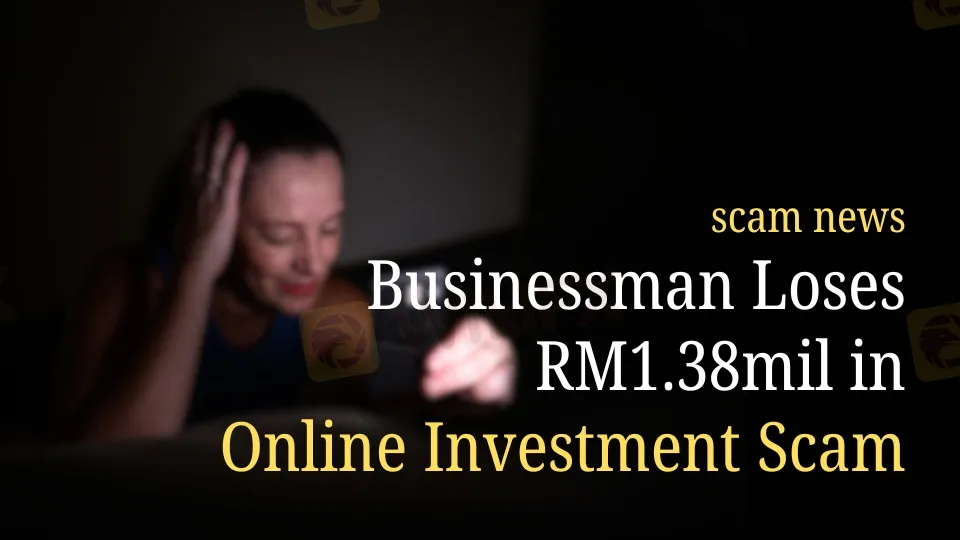简体中文
繁體中文
English
Pусский
日本語
ภาษาไทย
Tiếng Việt
Bahasa Indonesia
Español
हिन्दी
Filippiiniläinen
Français
Deutsch
Português
Türkçe
한국어
العربية
Businessman Loses RM1.38mil in Online Investment Scam
Abstract:Malaysian businessman loses RM1.38mil in IPO investment scam after falling for fraudulent overseas investment platform. Learn how to avoid such traps and protect your finances.

Tee, a Malaysian businessman, fell prey to a sophisticated internet investment fraud involving fictitious initial public offers (IPOs) in China. Tee was enticed by the promise of handsome profits and invested a stunning RM1.38 million—a figure that included his life savings and borrowed monies.
The fraud began in September of last year with benign social media advertising that piqued his interest. Tee, first suspicious, proceeded to investigate the potential, only to discover himself within a community of over 100 others trading Malaysian stocks. Tee, encouraged by tiny early earnings, significantly increased his investments over the following months.
False Promises of Profitability
Tee's investments looked to be thriving, with a claimed value of RM4.7 million on the bogus site. His withdrawal attempts, however, were constantly denied. Before enabling withdrawals, the platform's officials wanted an extra RM650,000 in “profit-sharing” fees, citing the need for new money.
“I told them to deduct the amount from my earnings, but they insisted on new cash deposits,” Tee stated, frustrated and powerless.
Red Flags and the Reality Check
Suspicions emerged when a buddy encouraged Tee to use the Semak Mule app, which revealed multiple police complaints linked to the account numbers to whom he had been transferring payments. Tee had no choice but to file a police report after confronting the site administrators who failed to resolve the issue.
The matter is currently being investigated by law enforcement under Section 420 of the Penal Code for cheating. They have warned the public to be cautious while doing online financial transactions, particularly with unfamiliar businesses. The authorities advise utilizing the Semak Mule app or going to the official website to check the legitimacy of bank accounts and phone numbers associated with such transactions.
How to Avoid Scams
- Verify Platforms: Always do extensive research to ensure the validity of investing platforms.
- Use Government Resources: To detect suspicious accounts, use tools such as the Semak Mule app.
- Beware of High Returns: Be skeptical of schemes offering unrealistically high or guaranteed returns.
- Avoid Big Upfront Payments: Do not send large quantities of money without adequate verification.
- Consult Professionals: Seek advice from certified financial advisors before committing funds.
Final Thoughts
Tee's sad experience should serve as a warning to anybody thinking about making an internet investment. Scams in the digital age are growing more sophisticated, relying on trust and the attraction of quick money. Vigilance, skepticism, and reliance on trustworthy sources are essential for protecting your hard-earned money. Always remember that if anything seems too good to be true, it most often is.

Disclaimer:
The views in this article only represent the author's personal views, and do not constitute investment advice on this platform. This platform does not guarantee the accuracy, completeness and timeliness of the information in the article, and will not be liable for any loss caused by the use of or reliance on the information in the article.
Read more

The Dark Side of Trading Gurus: Are You Following a Fraud?
Across social media, YouTube, and countless online forums, self-proclaimed trading ‘gurus’ promise to share their winning strategies for a price. These so-called experts claim to have cracked the code, offering courses, investment tips, and mentorship schemes that guarantee success. However, in reality, many of them are little more than sophisticated scammers, preying on the financial aspirations of their followers.

Authorities Alert: MAS Impersonation Scam Hits Singapore
MAS scam alert: Scammers impersonate officials, causing $614K losses in Singapore since March 2025. Learn how to spot and avoid this impersonation scam.

Billboard Warns of Crypto Scams Using Its Name – Stay Alert!
Billboard warns against fake crypto scams using its brand. Learn how to spot fraud and protect yourself from fake promotions.

Rising WhatsApp Scams Highlight Need for Stronger User Protections
UK consumers lose £2,437 on average to WhatsApp scams. Revolut demands stricter verification and AI monitoring to combat rising fraud on Meta platforms.
WikiFX Broker
Latest News
Interactive Brokers Launches Forecast Contracts in Canada for Market Predictions
Authorities Alert: MAS Impersonation Scam Hits Singapore
INFINOX Partners with Acelerador Racing for Porsche Cup Brazil 2025
The Impact of Interest Rate Decisions on the Forex Market
Billboard Warns of Crypto Scams Using Its Name – Stay Alert!
STARTRADER Spreads Kindness Through Ramadan Campaign
How a Housewife Lost RM288,235 in a Facebook Investment Scam
Rising WhatsApp Scams Highlight Need for Stronger User Protections
A Trader’s Worst Mistake: Overlooking Broker Reviews Could Cost You Everything
The Daily Habits of a Profitable Trader
Currency Calculator







